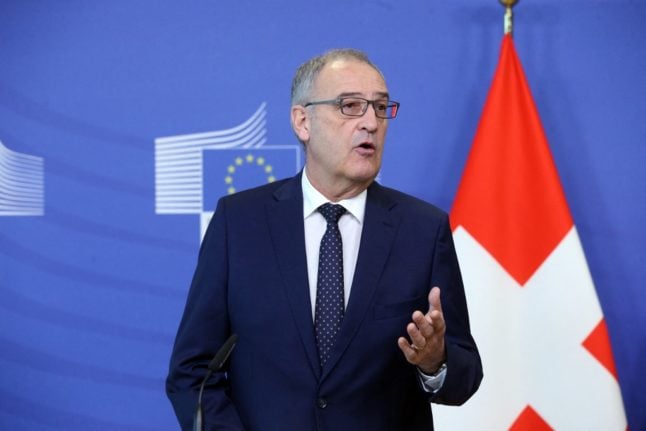Brussels has made no secret of its growing impatience to nail down a “framework agreement” to unify a patchwork of accords with Bern, 13 years in the making.
“In a negotiation, the final metres are the most difficult,” European Commission president von der Leyen said at the start of the meeting.
“I do, however, think that it should be possible to find compromises and conclude our institutional framework agreement. We just need some flexibility on both sides.”
For the EU, negotiations on the deal concluded in 2018 – but the Swiss have continued to press for changes and have so far balked at signing.
The agreement would rejig five major agreements within 120 bilateral accords that govern non-EU member Switzerland’s relations with the bloc.
READ ALSO: ‘Swiss autonomy’: Does Switzerland need a better agreement with the EU?
Among other points, they touch on access to the single market and fine-tuning applicable Swiss and EU laws.
“Over the past months, our chief negotiators have conducted very intense negotiations on the items which remain outstanding,” Swiss President Guy Parmelin said.
“These discussions have been far from easy, however, but I think I can say that both sides have shown their commitment to make a success of these negotiations today.”
Fears abound that failing to secure the framework deal could jeopardise Switzerland’s relationship with its largest trading partner at a time when more than half of all Swiss exports go to the bloc, which all but surrounds the landlocked country.
‘Prerequisite’ for good EU-Swiss relations
Declarations that the deal was nearly dead have multiplied in recent months.
Some hope of a comeback was restored with a report in Switzerland’s Blick newspaper this week suggesting Bern would offer easier access to Swiss residence permits for people from newer EU member states in eastern Europe in exchange for a fresh revision of the deal.
READ ALSO: EXPLAINED: What non-EU nationals (including Britons) need to know about Swiss work permits?
While not really comparable to Brexit, Switzerland would face significant consequences if the framework agreement fell through.
Since 2008, the EU has insisted Switzerland must sign the agreement before concluding any new bilateral deals.
Brussels reiterated that position last week, with European Commission spokesman Eric Mamer insisting the agreement was “necessary to develop good relations between the European Union and Switzerland”.
“It is a prerequisite for these relations to continue,” he said.
Switzerland’s leader met von der Leyen with this warning in mind, while facing pressure from the economic and financial sectors to save the deal – and demands from opponents to not cave in to the EU.
Parmelin is from the populist right-wing Swiss People’s Party. Switzerland’s largest political party has for years led efforts to resist closer ties with the EU, and has described the framework agreement as a “Diktat from Brussels”.
There are also calls for the agreement to be put to a referendum, in keeping with the direct democracy system in Switzerland.
The overarching accord would require revising five existing bilateral agreements on free movement, industrial standards, agriculture, air and land transport – and the creation of a joint arbitration court that could enable compensation for breaches.
It would also require the creation of an arbitration court to settle differences between the two sides.
Bern has continued to ask for clarifications on three points: Swiss wage protection, state subsidies and a directive that would give EU citizens in Switzerland the same right to social security as Swiss citizens.
So far, Brussels has said it is willing to provide clarifications on certain points, but has ruled out any renegotiations.




 Please whitelist us to continue reading.
Please whitelist us to continue reading.
Member comments